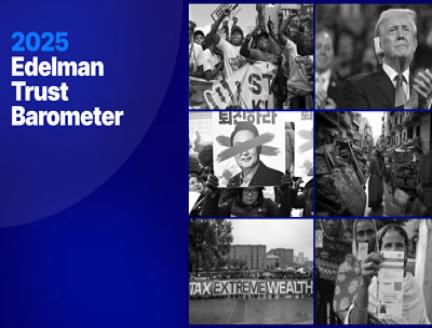Distrust is the default as NGOs and business under disproportionate pressure to solve societal issues
This week, Edelman South Africa released the local findings of the global communication firm’s 2022 Trust Barometer report, The Cycle of Distrust, revealing that 69% of South Africans surveyed have a tendency to distrust first – not believing information until they see evidence that something is trustworthy.
Global and local findings show a cycle of distrust spurred on by diminishing faith in government and media institutions who are being perceived as ultimately seeking short term benefits through exaggeration and division to gain clicks and votes.
These findings indicate that it will be up to our most trusted institutions – business and non-governmental organisations (NGOs) – to rebuild confidence in our country’s capabilities and stem the tide of misinformation.
“There are solutions to rebuild trust in these vital institutions, by following the example set by their counterparts in the NGO and business space,” said Karena Crerar, Managing Director for Edelman South Africa.
“Our findings suggest that the quality of information disseminated is the most powerful trust builder, followed by holding other institutions accountable for wrongdoing, solid communication, and transparency,” said Crerar.
All these qualities, she said, are exemplified among top business and NGO leadership, who are setting the agenda in calling for transparency, real information, and accountability.
“While these findings show a worrying trend towards a very fearful and disillusioned society, the good news is that we can use these insights to create change. As communicators we need to think very carefully about the responsibility we have to the industry, our clients and society to promote greater understanding and improved levels of trust,” said Crerar.
Edelman has studied trust for more than 20 years and believes that it is the ultimate currency in the relationship that all institutions—business, governments, NGOs and media—build with their stakeholders. Annually, Edelman’s Trust Barometer is widely cited in academic journals and global publications. It is broadly considered, “the yardstick for measuring global changes in trust and public opinion about leaders”.
According to Trust Barometer data, restoring trust will be the key to societal stability by recognising:
-
Business’ societal role is here to stay, with more expectations on business to tackle social issues and speak out on issues related to their respective industries.
-
The importance of demonstrating tangible progress; showing how systems work and where they succeed to restore belief in a better future.
-
Leadership must focus on long-term thinking and be solutions orientated over short-term gain.
-
Every institution must provide trustworthy information, sending out clear, consistent, fact-based information and communication to break the cycle of distrust.
Other findings from the South African report include:
-
78% of South African respondents were anxious about false information or fake news being weaponised; with these concerns reaching an all-time high.
-
72% of respondents think that South Africans lack the ability to have constructive and civil debates about issues they disagree on.
-
Job loss ranks as the top societal fear in South Africa, followed by climate change, hackers and cyber-attacks, losing freedoms as a citizen and experiencing prejudice and racism.
Today’s issues cannot be solved in a vacuum. From combatting climate change and racial injustice to planning for the future of work and supporting employees’ wellbeing, peoples’ expectations of institutions to come together to build a better world have never been higher. Together, institutions must prove that the system works for all, and focus on long-term thinking by choosing solutions over divisiveness.
“All institutions have a role to play in tackling these challenges and it is incumbent upon all of us as leaders to see our role as so much more than just running a business, we have a society we need to take care of and participate in. Without that, we have no business,” says Crerar.




